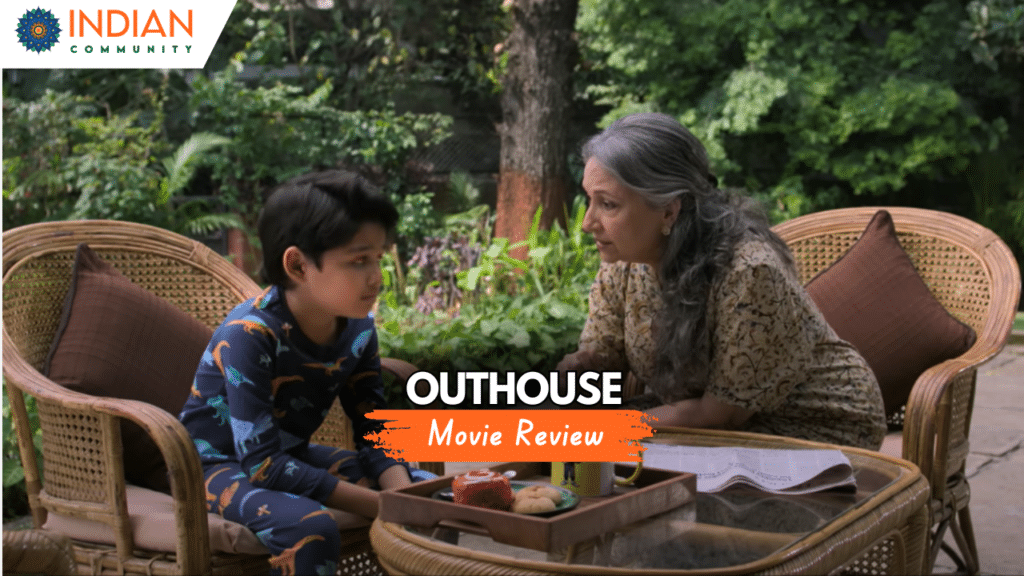Director Sunil Sukthankar brings a tender tale to life in OutHouse, blending humor, family dynamics, and a heartwarming bond formed between an elderly man, a pet dog, and a spirited family. The film’s charm lies in its simplicity and the poignant moments it delivers, making it a touching watch for lovers of slice-of-life narratives.
Plot Overview
The story revolves around Nana Modak (Dr. Mohan Agashe), a retired and cantankerous old man who accidentally ends up taking care of Pablo, a spirited dog who runs away from its owners, graphic designer Adima Roy-Phatak (Sharmila Tagore) and her grandson Neel (Jeehan Hodar). The duo embarks on a whimsical quest to retrieve Pablo, leading to unexpected moments of connection and camaraderie with Nana. Along the way, Adima’s creative struggles with her graphic novel and Neel’s youthful zest add layers to the narrative. The resulting tug-of-war over Pablo reveals deep emotional truths and the power of unexpected friendships.
Character Development
The performances anchor the film.
- Dr. Mohan Agashe as Nana perfectly captures the transition from a grumpy loner to a warm, caring individual, thanks to Pablo’s presence.
- Sharmila Tagore exudes grace as Adima, juggling her artistic challenges with a grandmotherly resolve to make life better for Neel.
- Young Jeehan Hodar is delightful as Neel, embodying youthful curiosity and determination.
The supporting cast, including Sonali Kulkarni and Neeraj Kabi as Adima’s daughter and son-in-law, add depth, though their subplots could have been more fleshed out.
Direction and Music
Sukthankar’s direction is restrained yet effective, allowing the characters and their relationships to take center stage. The detective-themed escapades are particularly well-shot, capturing the playful energy of Neel and Adima’s search for Pablo.
The jazz-infused score by Saket Kanetkar adds an intriguing charm to the lighter moments, blending seamlessly with the narrative’s emotional beats.
Pacing and Narrative
The film’s pacing is uneven at times, with certain scenes feeling rushed or underdeveloped. Nana’s transformation into Pablo’s caretaker and the eventual resolution of the story could have benefited from more nuanced writing. However, the core narrative retains its heart, ensuring the film’s emotional resonance.
Themes and Dialogues
At its core, OutHouse explores themes of companionship, individuality, and the overlooked aspirations of both the elderly and children. The dialogues often shine with wit and wisdom, such as Nana’s reminder to his son about self-reliance or Adima’s assertion of Neel’s independence. These moments elevate the film, even when the screenplay falters.
What Worked
- Standout performances, especially by Sharmila Tagore and Dr. Mohan Agashe.
- Heartwarming moments of connection and humor.
- Engaging detective-themed sequences and visual storytelling.
- A delightful score that enhances the film’s playful tone.
What Didn’t Work
- Certain subplots lack depth and resolution.
- Some transitions and character arcs feel oversimplified.
- Uneven pacing in parts of the narrative.
Final Verdict
OutHouse is a charming, feel-good film that strikes a chord with its heartfelt moments and standout performances. While it may not delve deeply into its subplots, its core message of finding joy in unexpected bonds ensures a memorable viewing experience.
Rating: 3.5/5
Should You Watch It?
If you’re in the mood for a lighthearted, emotionally uplifting story with endearing characters and a touch of humor, OutHouse is worth your time. It’s a film that leaves you smiling, reflecting on life’s simple pleasures.

